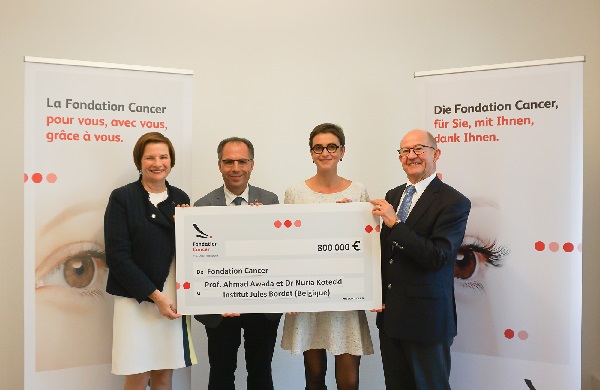 L-R: Lucienne Thommes, Director of Fondation Cancer; Prof. Dr. Ahmad Awada, Head of the Department of Medicine and Medical Oncology at Jules Bordet; Dr. Nuria Kotecki, medical oncologist; Carlo Bock, President of Fondation Cancer;
Credit: Fondation Cancer
L-R: Lucienne Thommes, Director of Fondation Cancer; Prof. Dr. Ahmad Awada, Head of the Department of Medicine and Medical Oncology at Jules Bordet; Dr. Nuria Kotecki, medical oncologist; Carlo Bock, President of Fondation Cancer;
Credit: Fondation Cancer
Fondation Cancer has just presented a cheque to researchers from the Belgium-based Institut Jules Bordet to support the BrainStorm project for research on improving the management of cerebral metastases.
As part of the foundation's support for research, Dr. Carlo Bock, President of Fondation Cancer, and Lucienne Thommes, Director of Fondation Cancer, presented a cheque for €800,000 to the researchers Prof. Dr. Ahmad Awada and Dr. Nuria Kotecki from the Institut Jules Bordet. The project entitled "BrainStorm: a Brain metastases research Platform to tackle the challenge of CNS metastases in solid tumors" aims to improve the management of patients with cerebral metastases.
In recent years, advances in the systemic management of patients with metastatic cancer have resulted in an improved survival rate for these patients. As a result, there is an increase in the number of patients with cerebral metastasis, which often occurs later in the disease. The incidence of brain metastases varies according to the primary cancer involved. They are more commonly found in lung cancers, breast cancers, kidney cancers and melanomas.
Despite an improvement in locoregional treatments, the prognosis of these cerebral metastases remains pessimistic and systemic treatments rarely make it possible to obtain an objective response on progressive brain lesions. The quality of life of the patients is impacted by the brain tumour and by the local treatments received.
In addition, patients who progress after local treatment have few therapeutic options. It is therefore important to improve the knowledge of the clinical, radiological and genomic characteristics of brain metastases of solid tumours in order to improve the outcome of the affected patients and to develop clinical studies adapted to the medical needs of patients.
From a biological point of view, it is known that brain metastases share alterations that are not necessarily detected in primary tumours, regional lymph nodes or extracranial metastases. As a result, genotyping a primary tumour or an extracranial metastatic site could potentially overlook important mutations that could be targeted by specific drugs present in brain metastases. In addition, metastases of the central nervous system may carry specific mutations conferring drug sensitivity / resistance or activation of another signaling pathway interfering with drug activity. In addition, an analysis of genetic material (DNA) of brain metastases is rarely possible because it involves performing invasive surgical specimens.
As such, better insights into the evolution of the epidemiology and biology of brain metastases are considered key to developing new treatment strategies and identifying promising therapeutic targets for new drugs, thus improving survival rates and the quality of life of patients. In this context, the multidisciplinary clinical and translational research platform on brain metastases, BrainStorm, was launched at the Institut Jules Bordet. This programme will target people with solid metastatic tumours (breast, lung, melanoma, other tumours), but who do not have brain metastases, who have been newly diagnosed and are at a high risk of developing cerebral metastases.
L’étude sera menée dans plusieurs centres en Belgique, en France et au Luxembourg où des patients du CHL avec des cancers du sein et du poumon vont y être inclus
The study will be carried out in several centres in Belgium, France and Luxembourg, where breast and lung cancer patients from the Centre Hospitalier de Luxembourg (CHL) will be included.








